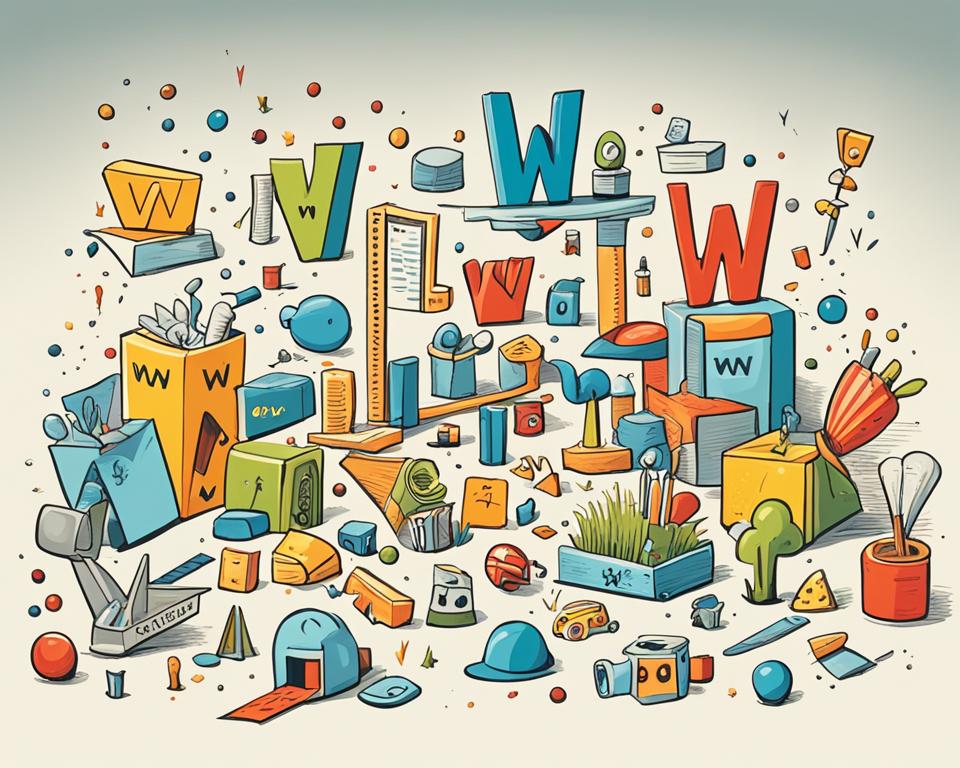The letter W is the 23rd letter of the English alphabet and is pronounced as “wuh” or “woo.” Learning W words is essential for effective communication, especially for kids. This article provides a comprehensive list of items that start with W, including foods, animals, household objects, clothing items, and more. It also offers vocabulary activities and games to help kids learn and reinforce W words. With over 100 items listed, this collection ensures a diverse range of learning material for various purposes.
Key Takeaways:
- W is the 23rd letter of the English alphabet.
- Teaching W words to kids is crucial for effective communication.
- This article provides a comprehensive list of items that start with W.
- Vocabulary activities and games are included to reinforce W word learning.
- The list features over 100 items, ensuring a diverse collection for various learning purposes.
Table of Contents
List of Objects that Start with W
Looking for objects that start with W? From delicious foods to fascinating animals, useful household objects, and stylish clothing items, this comprehensive list features a wide variety of objects that begin with the letter W. Whether you’re a teacher planning vocabulary lessons or a parent looking for educational resources, this collection will help expand your knowledge of W words.
Foods That Start with W
- Wafer
- Waffles
- Watermelon
- Walnut
- And more…
Animals That Start with W
- Wallaby
- Walrus
- Warthog
- Whale
- And more…
Household Objects That Start with W
- Waffle Maker
- Washer
- Wall
- Window
- And more…
Clothing Items That Start with W
- Waders
- Waistcoat
- Wallet
- Watch
- And more…
Explore the fascinating world of W words with this extensive list of objects starting with W. Enhance your vocabulary and discover new words with ease!
Objects That Start with W for Kindergarten and Preschool
Introducing objects that start with the letter W to preschoolers and kindergartners is an excellent way to enhance their letter recognition and early reading skills. By familiarizing them with W words, children can expand their vocabulary and develop a strong foundation for language acquisition.
Here are some examples of objects that start with W:
- Waffle: A delicious breakfast treat made from batter cooked between two hot plates.
- Watch: A device worn on the wrist or carried in a pocket to tell time.
- Wasp: A flying insect with a slender body and a stinger.
- Washer: A machine used for cleaning clothes by agitating them in water.
- Wagon: A four-wheeled vehicle used for carrying goods or people.
- Window: An opening in a wall or roof that allows light and air to enter.
- Wood: The hard fibrous material that forms the trunk and branches of trees.
To help kids understand the meaning and usage of these words, each word can be accompanied by a simple sentence. For example:
“I love eating a crispy waffle topped with syrup for breakfast.”
“Mom always wears a shiny watch to keep track of time.”
“Be careful around the wasp as it can sting.”
“Dad put the dirty clothes in the washer to clean them.”
“We went for a ride in a colorful wagon at the carnival.”
“Look out of the window and see the birds flying.”
“This table is made of solid wood.”
Additionally, various learning packs and resources are available to support early literacy development. These materials provide engaging activities and worksheets to reinforce the recognition and understanding of W words, making the learning process enjoyable and effective.
By introducing objects that start with W, we can create a fun and interactive learning environment that fosters language acquisition and early reading skills. Start exploring W words with your little ones and watch their vocabulary bloom!
Vocabulary Activities for Objects That Start with W
In this section, we present a variety of engaging vocabulary activities and games designed to enhance language skills and introduce objects that start with the letter W. These activities are suitable for kids who are learning W words and can be used by parents, educators, or homeschooling instructors to make learning interactive and fun.
Activity 1: Blindfolded Guessing Game
A fun and exciting way to reinforce W word recognition is by playing a blindfolded guessing game. Gather a collection of objects that start with the letter W, such as a watch, wallet, or wand. Blindfold the child and have them feel the objects one by one, describing their shape, texture, and use. The child can then guess the name of each object, promoting tactile learning and vocabulary development.
Activity 2: Reading Books with W Words
Reading books that feature W words is an excellent way to expand vocabulary and introduce new concepts. Choose storybooks or picture books that focus on themes related to W words, such as adventures, nature, or animals. As you read together, encourage the child to identify and discuss the W words they encounter. This activity enhances reading comprehension skills while building a stronger W word repertoire.
Activity 3: Unscrambling W Words
A challenging yet enjoyable activity is unscrambling W words. Create a list of W words and scramble the letters. Provide the child with a pen and paper, and challenge them to unscramble the words correctly. This activity promotes problem-solving, critical thinking, and spelling skills while reinforcing the recognition of W words.
Activity 4: Creating Snacks with Foods That Start with W
Combine learning with creativity by involving the child in cooking or preparing snacks using foods that start with the letter W. For example, make delicious waffle sandwiches, prepare a watermelon salad, or bake walnut cookies. As you cook or bake together, discuss the names of the ingredients and their significance. This sensory activity not only introduces W words but also provides a hands-on approach to learning.
These vocabulary activities are designed to engage children in interactive learning experiences while expanding their knowledge of objects starting with W. By incorporating these activities into everyday routines, parents and educators can create a stimulating environment that promotes language development and fosters a love for learning.
Commonly Used W Words for Kids
If you want to expand your child’s vocabulary, teaching them W words is a great place to start. W words are commonly used in everyday language and can help kids express themselves more effectively. In this section, we’ve compiled a list of commonly used W words for kids, categorized into various groups:
Animals:
- Whale
- Walrus
- Wombat
Food:
- Watermelon
- Waffle
- Wheat
Objects:
- Window
- Watch
- Wallet
Places:
- Washington
- Wales
- Winnipeg
Plants:
- Willow
- Wisteria
- Water lily
By learning these words, kids will have a solid foundation for expressing themselves and understanding different aspects of the world around them. Encourage your child to practice using these words in sentences and engage in conversations that incorporate W words. Remember, learning is most effective when it’s fun and interactive!
| Category | Examples |
|---|---|
| Animals | Whale, Walrus, Wombat |
| Food | Watermelon, Waffle, Wheat |
| Objects | Window, Watch, Wallet |
| Places | Washington, Wales, Winnipeg |
| Plants | Willow, Wisteria, Water lily |
Cool Words That Start with W
In this section, we’ll explore a fascinating collection of cool, unusual, and interesting words that all start with the letter W. These words are not only fun to say but also serve as a great way to expand your vocabulary and enhance your writing abilities. Let’s dive right in and discover some of these captivating W words!
“Whimsical” – characterized by a playful or fantastical nature; driven by imagination and creativity.
“Wacko” – someone or something that is eccentric, unconventional, or amusingly strange.
“Wanderlust” – a strong desire or impulse to travel and explore the world.
“Wistful” – feeling or showing a longing, yearning, or gentle sadness for something or someone.
“Witty” – possessing a clever or humorous intellect, often expressed through clever remarks or wordplay.
“Whizbang” – something that is innovative, impressive, or highly effective.
These W words are sure to add flair and charm to your conversations and written compositions. So go ahead and incorporate them into your language repertoire to stand out and captivate others with your unique word choices.
| Word | Definition | Usage |
|---|---|---|
| Whimsical | Characterized by a playful or fantastical nature; driven by imagination and creativity. | The artist’s whimsical paintings transported viewers to a whimsical world filled with vibrant colors and imaginative creatures. |
| Wacko | Someone or something that is eccentric, unconventional, or amusingly strange. | Her wacko sense of style always turned heads and sparked conversations wherever she went. |
| Wanderlust | A strong desire or impulse to travel and explore the world. | Her wanderlust led her to embark on a solo backpacking adventure across Europe. |
| Wistful | Feeling or showing a longing, yearning, or gentle sadness for something or someone. | As she looked out of the window, a wistful expression crossed her face, reminiscing about her childhood memories. |
| Witty | Possessing a clever or humorous intellect, often expressed through clever remarks or wordplay. | His witty banter always kept the audience entertained during his stand-up comedy performances. |
| Whizbang | Something that is innovative, impressive, or highly effective. | The new smartphone model boasts a whizbang camera system that takes stunning photos in low-light conditions. |
Positive Words That Start with W
In a world where positivity can make all the difference, incorporating positive words into our language is a powerful tool. The letter W offers a wonderful array of positive words that can uplift our spirits and foster a optimistic mindset. Here are some examples:
- Winner: Celebrate your victories, big or small, and embrace yourself as a winner.
- Wise: Wisdom brings clarity and allows us to make informed decisions.
- Worthy: Remind yourself that you are deserving of love, respect, and success.
- Warm: Spread warmth through kindness, affection, and empathy.
- Witty: Appreciate and cultivate your clever, creative, and humorous side.
- Wonderful: Embrace the wonders of life and celebrate the beauty that surrounds you.
Introducing these positive W words into your vocabulary can have a transformative impact. They help reduce conflicts, boost confidence, and leave a pleasant impression on others. By incorporating these words into our daily conversations, we can promote positivity and optimism, creating a brighter and more harmonious environment.
Conclusion
Learning words that start with W is an essential part of language development for kids. The extensive list provided in this article covers a wide range of categories, including foods, animals, household objects, clothing items, and more. By familiarizing children with these W words, parents and educators can help them enhance their vocabulary and communication skills.
In addition to the comprehensive list, this article also offers vocabulary activities and games that make learning fun and interactive. Engaging in blindfolded guessing games, reading books featuring W words, and unscrambling words can further reinforce letter recognition and understanding. These activities, combined with the rich list of W words, provide a holistic approach to learning.
Furthermore, this article highlights the importance of positive language by featuring positive W words. Introducing words like wise, warm, and wonderful not only enhances communication skills but also promotes positivity and optimism among children. Encouraging the use of positive words can have a lasting impact on their relationships and overall mindset.
Overall, this article serves as a valuable resource for parents and educators looking to expand children’s vocabulary, improve language skills, and foster a positive learning environment. By incorporating the W words and engaging in vocabulary activities, children can develop a strong foundation for effective communication from an early age.
FAQ
What are some examples of items that start with W?
Examples of items that start with W include water, walk, walnut, wafer, waffles, wallaby, walrus, warthog, whale, waffle maker, washer, wall, window, waders, waistcoat, wallet, watch, wood, wagon, etc.
Why is it important to teach W words to kids?
Teaching W words to kids is crucial for effective communication as many common words start with W. By learning W words, kids can expand their vocabulary and improve their language skills.
How can I help my preschooler or kindergartner recognize and learn W words?
You can help your preschooler or kindergartner recognize and learn W words by using objects that start with W. Examples include waffle, watch, wasp, washer, wagon, window, wood, etc. Each word can be paired with a simple sentence to help kids understand the meaning and usage.
What are some vocabulary activities for learning W words?
Some vocabulary activities for learning W words include blindfolded guessing games, reading books that feature W words, unscrambling W words, and creating snacks using foods that start with W. These activities make learning fun and interactive while reinforcing the recognition and understanding of W words.
Can you provide a list of commonly used W words for kids?
Sure! Here are some commonly used W words for kids: window, watermelon, walk, wagon, whale, waffle, weather, etc. This comprehensive list provides an extensive range of W words for kids to expand their vocabulary and language skills.
Do you have any cool and interesting W words?
Yes! Here are some cool and interesting W words: whimsical, wacko, wanderlust, wistful, witty, whizbang, etc. Introducing these unique words can jazz up kids’ language skills and enhance their writing abilities.
Can you suggest some positive words that start with W?
Absolutely! Here are some positive words that start with W: wise, warm, winner, witty, worthy, wonderful, etc. Introducing these positive words helps promote positivity and optimism in communication and daily life.


